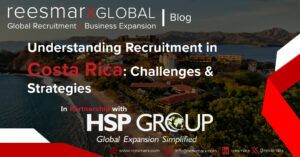Finding the ‘right fit’ for a team is never more important, than when an organization is looking to replace an established long-term executive. The loss of an experienced leader in any department, can quickly impact culture, productivity and the efficacy of the team.
One of the biggest challenges for organizations is not hiring within entry-level or middle management ranks, but finding that seasoned executive with the technical, industry and interpersonal skills, to assume important roles. It is a high-stakes recruitment exercise, and many employers find sourcing executive leadership to be the most time consuming, expensive, and sometimes frustrating process for domestic opportunities, and increasingly, for new offices and divisions overseas in emerging markets.
In our experience recruiting internationally, these are the top four challenges that businesses face, when attempting to independently hire executives.
1. Top Talent Stays Put
If a professional has established themselves within a large corporation, and have gained industry experience as a recognized member of the company, they tend to remain with their employer. This is even more true if the organization has a low rate of attrition for C-Level executives, and there is the perception of a low-turnover. Recruiting leading talent from a corporate environment to a start-up venture, is even more difficult, as start-up businesses offer less stability, with high failure rates.
2. Experienced Executives Are Not Always Open to Geographic Moves
Some of the most dynamic and exciting career opportunities for C-Level executives, are internationally located. While most senior level management types are used to business travel, the opportunity to work remotely (unless consulting) isn’t usually an option for them, as they are required to supervise and mobilize teams daily, in-office.
Other considerations for C-Level executives are cultural and benefits based. If they have earned extensive vacation time and health and wellness benefits that they depend on, to provide care for family members, moving overseas can complicate more than just the executive. Family needs, and concerns about comparable healthcare benefits are two factors that are heavily considered, before proceeding to an employment contract and salary negotiation.
3. Advertising Prior to Transition for Senior Level Positions
Even when a top executive may be entertaining the idea of moving to another employer, they are unlikely to respond to advertisements, expecting instead to be approached directly by the company, or a professional recruiter. It is risky for a senior level executive to disclose that they are searching for new opportunities, which is why they prefer a personalized and confidential approach.
4. Non-Competition and NDA Agreements Can Make Executives Hesitate
Another challenge that executive level personnel experience when entertaining another job offer, is the potential conflict or legal issues that may arise, from accepting a role with a business that is viewed as a competitor, within the same industry. Is the executive free of legal liability, if they share their portfolio of work and achievement benchmarks? What constitutes sharing of intellectual property or knowledge, when an executive needs to demonstrate their ability to lead a team, or project manage with positive fiscal results?
Our global recruitment team specializes in sourcing, interviewing and connecting leading high-growth businesses with talented leadership. Register online in our international talent database, or contact us for more information about exciting opportunities. At reesmarx, we connect exceptional candidates with career advancing roles, and help employers avoid the cost, pitfalls and limitations of in-house recruitment.






